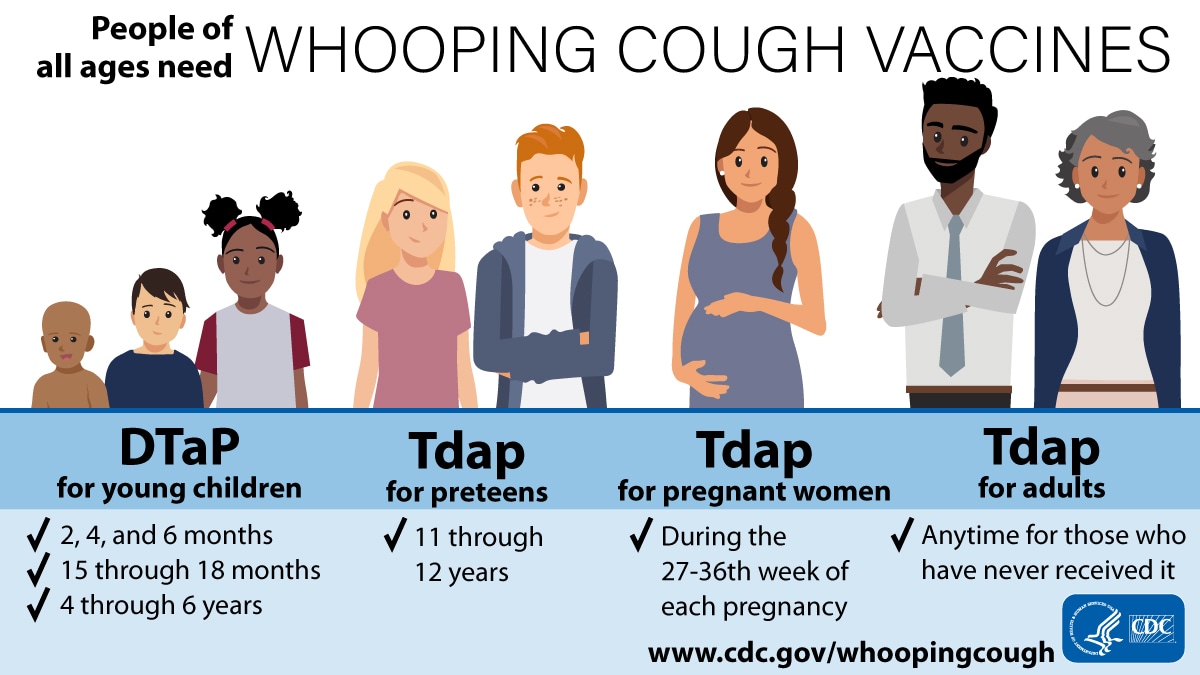Key points
- Whooping cough, also known as pertussis, is a very contagious respiratory illness.
- Whooping cough may begin like a common cold, but unlike a cold, the coughing can last for weeks or months.
- Treating whooping cough early with antibiotics may make the infection less serious.

What it is
Whooping cough is a respiratory illness caused by a type of bacteria called Bordetella pertussis. The disease is only found in humans.
Whooping cough bacteria attach to the cilia (tiny, hair-like extensions) that line part of the upper respiratory system. The bacteria release toxins (poisons), which damage the cilia and cause airways to swell.

Symptoms
Symptoms of whooping cough can vary for people based on their age and if they've been vaccinated or not.
Risk factors
Age and underlying medical conditions can increase someone's risk for getting a severe case of whooping cough. It's especially important to prevent these people from getting sick.
Age
Babies younger than 1 year old are at greatest risk for getting whooping cough and having severe complications from it.
Medical conditions
People with pre-existing health conditions that may be worsened by whooping cough are at high risk for developing a severe infection. Some conditions that could be made worse by whooping cough include, but are not limited to:
- Immunocomproming conditions
- Moderate to severe medically treated asthma
How it spreads
The bacteria that cause whooping cough spread easily from person to person through the air. When a person with whooping cough sneezes or coughs, they release small particles with the bacteria in them. Other people can then breathe in the bacteria.
These bacteria can spread when people spend a lot of time together or share breathing space.
People can be contagious for weeks
People can spread the bacteria from the start of symptoms and for at least 2 weeks after coughing begins.
Taking antibiotics early in the illness may shorten the amount of time someone's contagious.
People can unknowingly spread the bacteria
Some people have mild symptoms and don't know they have whooping cough, but they can still spread the bacteria to others. Many babies who get whooping cough are infected by older siblings, parents, or caregivers who don't know they have it.
Prevention

Vaccination
The best way to prevent whooping cough is to get vaccinated. CDC recommends whooping cough vaccination for everyone.
Antibiotics
Preventive antibiotics are also known as postexposure antimicrobial prophylaxis (PEP). These are medicines given to someone who has been exposed to harmful bacteria to help prevent them from getting sick.
Some people should receive antibiotics to prevent them from getting sick if they have been around someone with whooping cough.
If you've been exposed to someone with whooping cough, talk to a healthcare provider about preventive antibiotics. A healthcare provider or health department generally decides who should get preventive antibiotics.
Good hygiene
CDC recommends practicing good hygiene to help prevent the spread of bacteria and viruses that can cause many respiratory illnesses.
Re-infection
People who've had whooping cough have some immunity to future whooping cough infections. However, getting sick with whooping cough doesn't provide lifelong protection.
Testing and diagnosis
Whooping cough can be difficult to diagnose because the signs and symptoms are often similar to other respiratory illnesses. It can be helpful to know if you've been in contact with someone who has whooping cough.
Healthcare providers can diagnose whooping cough by doing a
- History of typical signs and symptoms
- Physical exam
- Laboratory test of a mucus sample from the back of the throat
- Blood test
Treatment and recovery
It's very important to treat whooping cough early, before coughing fits begin. Healthcare providers generally treat whooping cough with antibiotics. Further treatment in the hospital may be required if symptoms are serious.
